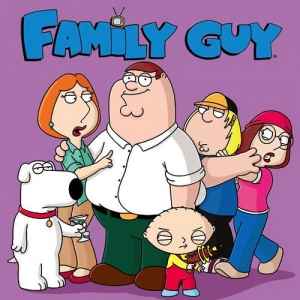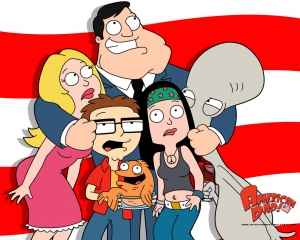Modern Propaganda: How Animated Comedies Can Change Our Opinions

Modern animated comedies like Family Guy, American Dad! and South Park can be considered one of the heaviest impacting forms of modern propaganda. These shows, because of their animated nature, can do things (including making explicitly edgy statements) that a non-animated show could never get away with. There are virtually no animated shows very serious in nature, and there is a reason for this: when exposed to humor, people are more apt to be accepting of the content. This gives the writers of these shows a “rule-breaking” edge. They can say things through their characters that no regular actor could get away with saying (and even if they could, most actors wouldn’t want to be branded with outrageous statements or ideologies). Perhaps a closer look should be taken into exactly what messages can be found imbedded in modern animated comedies, and what the writers are actually trying to tell its viewers.
Family Guy
Seth MacFarlane’s Family Guy is best known for its use of flashback, cut away jokes, and pop culture references. It features the average blue-collar, dysfunctional family that becomes entangled in misadventures and otherwise outrageous circumstances.

Harmless enough, right? Well, if you don’t include the baby with a British accent who tries constantly to kill his mother, an alcoholic talking dog, and a dad who’s more clueless than a goldfish, then the show tends to lack substance, excluding the fact that it already severely lacks a structured plot. That is okay though, because animated comedies are rule breakers. They can ignore things like plot because they are funny! Shows like Family Guy are able to indirectly channel ideologies toward its viewers because comedy helps take the sting out of their statements.
American Dad!
American Dad! is known most notably for its concentration on subtler humor that works more closely around its characters and the situations they encounter. It features the average American conservative family, from Stan’s wife Francine, his two teenage children, a talking goldfish, and an alien living in the attic, which encompasses a broad spectrum of conservative qualities from the actions of the father to the rest of the family.

Both Family Guy and American Dad! appear on FOX network, but it’s interesting as well because this show, while still remaining largely popular, seems to draw in a smaller demographic than Family Guy. Instead of drawing a large focus on what happens to them, American Dad! seems to focus more on what the family does about their circumstances instead. In this way, now two animated shows exist that each identify more with one of both major political parties, covering the full spectrum of political opinion.
South Park
The creators of South Park, Trey Parker and Matt Stone, really knew the power invested in exploring opinions through the use of comedy. Probably the most intricate and well-planned satire in the history of animation and television itself, South Park has shown that it isn’t afraid to push boundaries on all of the touchy subjects. Perhaps the show draws its power on the notion that their reputation upholds them. Their pilot episode depicted an alien encounter that resulted in a probe being placed in a boy’s rectum, a boy who drop kicked his baby brother around for fun, and a group of 7-year-old friends who spoke like potty-mouthed college students with the minds of a 7-year-old. Being glaringly obvious, it is a show that aimed to be blunt and offensive, and it was that stability that projected the show into a cult classic, and ultimately one that millions of teenagers would secretly tune into after their parents went to bed.

The bluntness of the show is alarmingly enticing, and one that provides an experience that no other show has before it. First time viewers would witness the show for one major reason: because they heard others say they simply had to watch it to see what it was about. This would have been the ideal atmosphere for a South Park-perfect-storm. With that base being established throughout the first season, it allowed its creators to push on to bigger and badder things, knowing it had the support of its viewers. It simply accepted what it was as a show meant to be offensive and vulgar, and not surprisingly, those are both chemicals for comedic success. Because it is known to be offensive, they can virtually touch on any subject they please, and are almost guaranteed a positive response from regular viewers. Although it is a less mainstream genre of comedy, those who enjoy it typically enjoy it a lot, and for good reason.
What Gives Animated Comedies An Edge?
The reason that animated shows are a perfect medium to channel thoughts and ideas around so abstractly is simple: depersonalization. Because its characters are only voiced actors, the characters begin to take on an identity of themselves, because viewers attach ideas, quotes, thoughts, motivations, actions, and philosophies to the characters we view, and not to those who create them. In Family Guy and American Dad!, we don’t readily attribute Peter’s blind stupidity or Stan’s unyielding arrogance to Seth MacFarlane, who voices many of his shows’ characters, but instead to only Peter and Stan.

Why does this happen? Mostly because people see them interact as their animated persona, and, because we learn about characters (animated or not) from those actions, over time they build credibility, and ultimately, we believe them to exist in some way. If, for an episode, Peter were to turn into a full-scale racist, as viewers we would mostly be at least accepting of the humor expected in the show, even if that would ordinarily offend someone. This is different from when viewing a real actor reflect these opinions for two major reasons.
First, these shows can be thought of as a credibility clock, being that over time audiences grow to expect certain types of humor in the shows, and become more accepting of the content that falls in line with the expectations of that show. In this case, an episode on racism from Family Guy would be seen as funny because Peter’s stupidity acts as a safeguard, and, because we have come to know Peter’s character, we expect that kind of ignorance from him. Likewise, if an episode of South Park were to instead to make an episode on political correctness, it would be even funnier to its viewers because we have come to expect South Park to be bluntly offensive and insensitive.
In the beginning of a series, had a character done something very outrageous in some way, the show would, in response, be branded to contain those types of ideas from the beginning. So, unless a show had a goal similar to South Park, typically it would be expected to start safely, with some elements included that would be expanded on in the future. When the first Family Guy aired after the Super Bowl XXXIII, it received wide skepticism because of its controversial content. Still, it remained popular through its second season, before being beaten out on the network by the show Frasier. After facing near cancellation, a few months later it returned as a cult classic and renewed the interest of its viewers immensely. After it secured its place in the hearts of American television audiences once more, it began to stockpile the expectations of the viewer. In the later seasons of these shows, notice how all of the humor has gotten cruder, ruder, more obvious, and in some cases more graphic and otherwise simply more blunt. Every season South Park breaks new ground when pushing the boundaries of the extremely sensitive topics. Family Guy has gotten much gorier and contains more physical violence in the later seasons. American Dad! has also become more crude in subject matter. Why can they do this? Viewers accept these additions because of the notoriety the show has created for itself. Expectations are living and breathing, and grow with its viewer population as a show progresses in time. We accept new ideas and new ground as character/plot development, and are almost thankful for new material to continue to enjoy.
Second, the writers of an animated comedy make sure to establish characters very well in the beginning, to allow growth and wiggle room over time for more complex situations. Because these characters are not real people, it’s important to define them well because a viewer will come to acknowledge those characters like they would with a regular actor. This means that, if an animated character has already been shown to act in a similar way (to a lesser degree) in the past, then viewers accept his/her growth as a character regardless of the subject matter. Over time, after they build up substantial credibility, it allows the writers more flexibility to investigate new subject material with their character, mostly because audiences will ultimately begin to believe them. In this case, character development is a key tool for writers to be able to eventually speak through these characters, and leave its viewers with messages to walk away with.
What Types Of Messages Can Be Projected?
Although the targeted audiences for mature animated comedies usually range from 14 to an adult for TV-MA shows, it seems that mostly pre-teens and younger teenagers dominate this realm of television. So, there is a reasonable concern among parents and choosing to let their children indulge in these shows. Some possible reasoning behind this might be found in an article published by another member of The Artifice, Robyn McComb, found here.
With any sort of show, fictitious, animated, both, or neither, there is usually a prevailing theme. Whether or not this is even realized by the creators, a show viewed by someone will be left with a message of sorts regardless of any further effort. What the writers are able to do is try their best to craft that message to be as clear as they want it to be with the tools they have to use, or else they leave the message to be received at face value, without any specific impression. In this way, writers and creators have a choice: either leave the message up for personal discretion, or try to make it more clear what they want the message to be, because a message will be received regardless of their efforts.
The point is, the heart of each resulting episode can be looked at as the prevailing opinions of the network, writers, and creators, and the backbone of the show itself. This is what each episode boils down to: their opinions about any particular topic being projected through their filter of comedy and directly into the retinas and then into the mind. In the meeting room, decisions are made for each joke placed in the show, including some and excluding others intentionally. If they didn’t agree in pre-production, the episode wouldn’t have included that element. With animated shows especially, they have the power to create their world exactly as they want it; they can create and destroy characters, change their surroundings on a whim, and otherwise distort reality in any way they see fit. The point is, their inception and creation is not accidental or serendipitous, but rather it is completely deliberate. This means that numerous benefits can be achieved from watching these shows with more depth than a laugh factor, and instead using them to critically analyze them for thoughts and opinions about life in America, politics, religion, sexism, and every other delightfully interesting and yet politically taboo subject excluded in non-animated shows.
Pop Culture Pleasures
Pop culture references are used excessively in these shows because of two major reasons; pop culture references are relatable and current, and because of that fact, dissenting opinions (Or over dramatized ones) can easily be rib tickling. Pop culture is a rare comedic candy that can spark conversation easily as well as also be used to maximize the laugh factor. In more cases than not, current pop culture is widely entertaining to us because we can relate to the events in real life. In Family Guy and South Park, cameos by actors playing real people or groups are often seen making appearances into these shows. For example, Family Guy has hosted a variety of pop culture characters from the 80’s to the present, including the Pope, Bill Clinton, Al Gore, Dane Cook, Lindsay Lohan, Miley Cyrus, the band KISS, and countless others. In South Park, they use character cameos more directly to poke fun at current events affecting that person. Other than characters, these shows also often use pop culture to reflect current events, and their opinions attached to them. They do this for the same reasons listed above; they are funny when be over-dramatized, over-worked, and otherwise satirical.
These shows, because of how wildly popular they have become, have the ability to change the opinions and mindsets of its audience. Being that the majority of this audience happens to be predominantly very impressionable youth, this can be considered a large source of power. Because these shows are animated, and regardless of how believable they can become, it’s hard to remember that they are more than cartoons. Continued exposure to debatable subject matter (such as gay rights, sexism, racism, religion, etc.) tends to desensitize the viewers, and when projected through the lens of that certain show, slowly begins to shift opinions of the audience. Animated comedies are one of the most effective methods of impressing opinions and beliefs onto its viewers, and it’s through the unique genre of animation that they are able to do so so successfully.
What do you think? Leave a comment.











NIce article, you’re correct on the observations you make here.
Thank you Walter.
Well, the thing with South Park, Family Guy (and all other television shows for that matter) is that it’s not value free. Sure it entertains you, but there’s a catch. They want something in return and that is your submission. For example, South Park mocks everyone and makes it look innocent but there is still an agenda, Saddam is still Satan’s boyfriend and Mel Gibson is still a lunatic running around in his underwear stealing vehicles while the Jews are put in a positive light and conspiracy theorists are called ”retarded” which is biased. It still fits with the western capitalist view of the world and they want you to believe it’s true.
Note that the messages are usually small and hidden in comedy entertainment, but if you look at the core and moral of the story you’ll find it’s purpose and that is to portray the typical western capitalist image of the world. Muslims are evil terrorists, theists are stupid, everyone who opposes Israel is an antisemite and conspiracy theorists are just retarded. The typical routine, really. It’s definitely not value free. It’s the very essence of propaganda.
A very interesting perspective. I also agree that there is always a catch to viewing a show like that, and yes, with animated comedies they are much more subtly hidden. Thanks for the comment.
Those are my sentiments completely. South Park is certainly the worse and most transparent offender.
It is in my view a very carefully constructed vehicle for establishment propaganda.
In fact it is so conspicuous in this regard it bought me to this page and to research the backstory of the series, and let’s just say I wasn’t surprised to find it was a rags to riches story that may as well be a Hollywood script – in fact I’m sure I have seen “that” movie more than once.
The whole facade of it being just a cartoon and humour by being offensive and no subject being off limits is just pretence that the show is anti establishment when in fact, if we listen to the message, the opposite is true and the conclusions the show ultimately pushes on the viewer are exactly the same as the establishment narrative.
This is true of of every single episode with a political message and there many obvious examples but I will just give one of the more recent episodes which was a commentary on NSA spying.
The show parodies people who object to the intrusive spying and yet use social media and the internet to complain about it – essentially the message is, why worry about spying when you put all your views out there on social media for the world to see?
Of course the answer is choice and permission, we choose what to put out on social media and give permission on what should and should not be viewed with privacy settings, but the show is not interested in real arguments, only pushing the idea that the government spying on you doesn’t really matter.
In the same episode a man is investigated by the NSA for a Twitter message threatening violence and we get the speech from the NSA guy on how the NSA is actually protecting his freedom.
The speech has virtually no humour and is delivered straight so that to anyone who has not suspended their disbelief, it sticks out like a sore thumb.
Clearly this is not in there as part of the entertainment but as part of the viewers “education”.
Essentially the message is that spying is necessary to keep us safe from the bogeyman and if it weren’t for the NSA we would be fighting for our lives.
It is the same asinine argument pushed by the establishment of course – that we must take your freedom to protect your freedom.
Note also the would be terrorist is a white American and the threat here is domestic terrorism.
The reason for that is again to push the establishment narrative that domestic terrorism is the real threat (no mention of Muslim terrorists in the whole episode) and so all Americans must be spied on.
Naturally the rebellious character accepts the argument as though it were a fate accompli rather than the illogical propaganda it actually is and basically thanks the nice NSA man for his reeducation.
And that is essentially what this show is all about – reeducating the public to accept the establishments narrative as though it were their own conclusions.
There has always been propaganda in the media and it is always tailored to a target audience – South Park is aimed at the young and rebellious rather than educated free thinkers and I’m certain it works very well.
Those boys (writers) sold their souls to the devil and people can take that metaphorically or literally.
Update (season 19)
Having just viewed the episodes to the most recent series it seems the propaganda is getting more aggressive and transparent.
It very much follows the “program” I outlined in my original reply, the pretense that is being rebellious, anti PC and in this case anti mass immigration when in fact it is ultimately pro all those things.
It even goes so far as to use the old trick of discrediting opposition by disingenuous association rather than by confronting the arguments.
As always counterarguments are not real arguments, just the most absurd strawmen built to be knocked down and of course they must be “conspiracy theories so that all counterarguments can be damned by association.
South Park is the ultimate propaganda tool when it comes to controlled opposition.
Personally I don’t like Trump but the fact South Park would make such a negatively definitive statement about a Presidential contender who is opposed to much of what the show ultimately promotes is very telling.
I am still waiting for the show that ridicules Clinton and how open her criminal activities are.
Or one that ridicules the Iraq invasion narrative and brings up the open support of terrorism in Libya and Syria which has directly caused the massive immigration crisis.
I guess I will be waiting a very long time because South Park has no interest in real political arguments or truth or real solutions, it is only there to push the globalist propaganda and undermine homogeneity and opposition to it.
I doubt the two idiot whores who are supposed to write this stuff actually do anymore – if they ever did. Certainly the topics and conclusions will be scrutinized before delivery to the target viewers to ensure it meets with approval of their pimps.
All of this is to distract you from noticing how many commercials you have to watch.
Or is it rather a very clever lineup of commercials from within the show? It might be worth looking into some things like product placement in these shows, and instances when they change the name just enough so that nothing is legally wrong, but we all still know that a cola is a coke and those obscure looking chips are doritos.
The “propaganda” in South Park, is more like political satire.
It absolutely is. They tap into pop culture and politics more than any other show I have seen, animated or not. Most of it is hilarious, but there have been a few times where I had to step back, pause, and ask myself what I just watched. Thanks.
I agree that animation allows artists to do things that say a live-action show couldn’t, but I don’t think it’s any more of an influential medium than anything else. I think what matters is the message and what individual writers are trying to say regardless of the medium.
I also agree with what Amena Banu said below, being that the shows are more of a perfect medium that has a great deal of potential, but recently its use has remained largely untapped considering what it has been in the past. Even during World War II, some cartoons from Walt Disney, that were meant for adults, heavily used war propaganda during a time when it was needed. Afterwards, it disappeared. It could be seen as a reserve, molded to fit the agendas of whomever sits at the head of the show or the station. I’m not saying they always do this, but if and when they choose to, animation has proven to be more effective. It’s a means to be used as a tool when the desire is present. Thanks for the comment.
It is just cartoons. The point of Family Guy, American Dad, South Park and so on is just to make fun of everyone and everything no matter what it is. They just want to have a good time and make everyone laugh.
That is also true to an extent. I enjoy all of the shows I mentioned thoroughly, and each for their own reasons. Read the comment and my response above please. It doesn’t always have to be used, but the potential is present and easily accessible. Thanks.
It’s all more “social satire,” and it’s been around for centuries.
-Charles Lee
these shows are very funny it reflects real life, I like them a lot.
I find these cartoons, particularly South Park, to be refreshing social commentary rather than propaganda.
I would have to say I enjoy South Park a great deal more than the others because of the boldness of the show. All that propaganda is meant to do is change your opinion about something, and through seeing the opinions of the writers undoubtedly makes someone either accept and reinforce their opinions or reject their own and adopt a new one. Either way, we are gently to moderately influenced simply by watching and enjoying these shows. Thanks for the comment.
South Park will always be the far superior animated comedy show on TV. Family Guy gets so blatantly partisan at times it detracts from the funnily inane humor. South Park doesn’t need to be so obvious with their political commentary because Parker and Stone are vastly more clever, and bipartisan, than any writers at Family Guy.
Well, and SP is superior because FG is horribly written. Pure hackery and aped material. FG is just plain awful and nobody in comedy has an ounce of respect for the show’s creator, Seth whatshisname. He’s loathed by both SP’s and the Simpson’s writers. Some of SP’s finest hours were the episodes hilariously detailing the many many ways in which FG sucks.
That’s not true, while I agree that South Park is the superior show, Family Guy can be even handed. Brian is the token liberal on the show, however there are times when he is shown out of touch and sometimes down right hypocritical. Plus Limbaugh is a big fan of the show and appeared on numerous shows. Also Beitbart was a friend of Seth Mcfarland. They met on Real Time and hit it off.
South Park USED to be a great show. Its recent installments (I’m stretching “recent” here, it’s been fairly poor for some time now) are just gimmicky and unfunny. The same for Family Guy. But at least FG handles comedy and commentary naturally.
It’s for some of your reasoning and those listed directly below that I chose to write this article. See how differently we all see these shows and what they can do? If not a single thing else, it makes us think, which is directly related to the influences being shown to us. Our opinions are either reinforced, challenged, or rejected when faced with material presented in these shows. It all influences us to form opinions about things. Thanks May, Jimmy, lila, and P.N. Bates.
It is well known that the folks who do Family Guy and the Simpsons love to bash conservatives.
Thanks for the post. These are fictional shows, but very much with real content.
I agree that there is a huge potential for propaganda in these types of shows, but I don’t think that is the intent. They make fun of anything, using current events and pop culture as material. As of now, I’d say the potential is largely untapped.
Family Guy doesn’t pull punches, never has, never will.
“propOganda” in the title is “propAganda”, right?
Really enjoyed reading this. Never gave that enough thought . .. that animated shows have far more leeway in terms of “crossing the line.” So what would you consider to be the most transgressive non-animated sitcom?
Well to be honest, I don’t watch too many sitcoms, but I have noticed a pattern. In the days of “Full House” sitcoms were a reflection of mostly clean, mild humor and all in good fun, much like their ancestors like “Leave it to Beaver” and “I Love Lucy” from many years past. More recently, I have noticed shows start to gently push social boundaries, which is to be expected in a progressive nation like ours. Little hints of “sleeping around” can be seen in shows like “Friends” or “2 and a Half Men”, gay marriage in shows like “Modern Family”, and many other things like that. As little as some of the more modern impressions are, being continually exposed to it is slowly starting to lead to greater acceptance and ultimately it has helped move these ideas toward mainstream acceptance. As long as people are aware of it, it’s not so mind numbing. I’m sure you’ve noticed a lot more sexuality in shows this decade, and raunchier situations, especially in comedy and sitcoms. That is the sort of propaganda I am speaking of: a shift in opinions. Thanks for commenting.
Interesting insights into how we accept cartoons and humor. I haven’t actually seen an episode from any of these shows >_< —so it would have been helpful if you had referenced a specific example from one or all of them. In any case, it makes sense that a message will be protected in a way when a cartoon is creating it, rather than actors. I also like the bit you added about the ignorant characters helping to soften certain hot subjects.
Thanks for the tip. I would recommend watching 2 episodes from each show, one from the first season and one from the later seasons, and you might start to see a glimpse of what I was describing. Also, South Park is in its own category, so prepare yourself (Ha). Thank you for the comment.
You have made a lot of good points about these shows and animated comedies in general. I believe it is easier for animated comedies to influence the viewer because of the amount of creative control the show has. Since these shows are animated, writers are allowed to get away with a lot of things. You are right that animated comedies are propaganda due to the messages the show reveals. South Park definitely has influence over people due to its dark satire and pop culture references. Satire works with animated comedies because exaggeration is funny. South Park used satire to show how rich male celebrities have a problem of sleeping with too many women. They exaggerated situations by having celebrities like Tiger Woods believe that they suffer from an illness instead of just admitting that they’re wrong. It is funny to see how this plays out and this is why animated comedies have so much influence over adults and teenagers.
I really like this article! These kinds of shows never really interested me. But this spin on them being modern propaganda is super interesting. Cool insights!
A convincing argument in what animated shows can do which live-action shows can not. The Family Guy episode ‘420’ is a good example of propaganda advocating the legalisation of weed. I doubt a live-action show on FOX could have done the same.
One element I would add to why these programs affect their viewers is the lack of consequence. The shows referenced in this piece in particular press the universal reset button at the end of every episode. In Family Guy, Peter address the fourth wall with a plea to cut to an exterior of the house to make everything reset and South Park kills off the same character in every episode with no consequence. With no consequence, the world becomes a small little utopia where everything they say goes, because the audience can’t see the positive or negative side effects of any actions. Opinions become ultimatums in the vacuum these shows cultivate. I think you touched on this when you mentioned some earlier sitcoms in another comment. Those shows like “Leave it to Beaver” also convey particular, albeit more conservative, opinions, but they too hit the reset button, avoiding the effects of the systems and world views they portray.
Interesting analysis, but I find your choice of shows strange. Family Guy and American Dad are written by the same group as is The Cleveland Show. I would argue that The Simpsons (as the first adult animation to enter primetime) has had a far greater impact. This show also references popular culture heavily. It is interesting to note that Simpsons was once considered controversial, but it is tame by modern standards. Still, many of its themes are questionable–especially the ever-present elements of child abuse and neglect.
Also, it is only American animated shows that are comedic. Many anime shows are very serious and dramatic in tone. Whether anime is geared to children or adults is debatable. At any rate, these convey a much different theme to a very different demographic.
I almost feel as though an account of ideological subject formation, as posited by, for example, Althusser, might be helpful here. Althusser highlights the media as one of the “Ideological State Apparatuses” which he identifies as being responsible in part for shaping the way in which we understand ourselves as “subjects,” people with individual beliefs and a level of free will. One could argue that animated comedies, approaching younger subjects than their intended audience, have an outsize influence on ideology formation.
This is a good post and interesting articles, however, I do have some points to raise.
1. Even the creators of South Park would not consider their show to be “well-planned.” It is perhaps intricate at times, but mostly unintentionally so. Interviews with Matt Parker and Trey Stone reveal that they had no idea what they were doing for the first 8 or 9 seasons. Even in one of the last episodes in Season 9 or 10, Stan says that their show sucked because the creators had not really found their formula yet. In addition, the show is written on a weekly basis. So there is an inherent flexibility to what they’re able to do. Having a 6 day deadline rarely equates to being “well-planned.” They literally stream news and pop culture for a few days and throw all the jokes they can at a wall and whatever sticks they run with by day 6.
Other than that your article was fine
These shows are certainly influential. But, I wouldn’t call them propaganda.